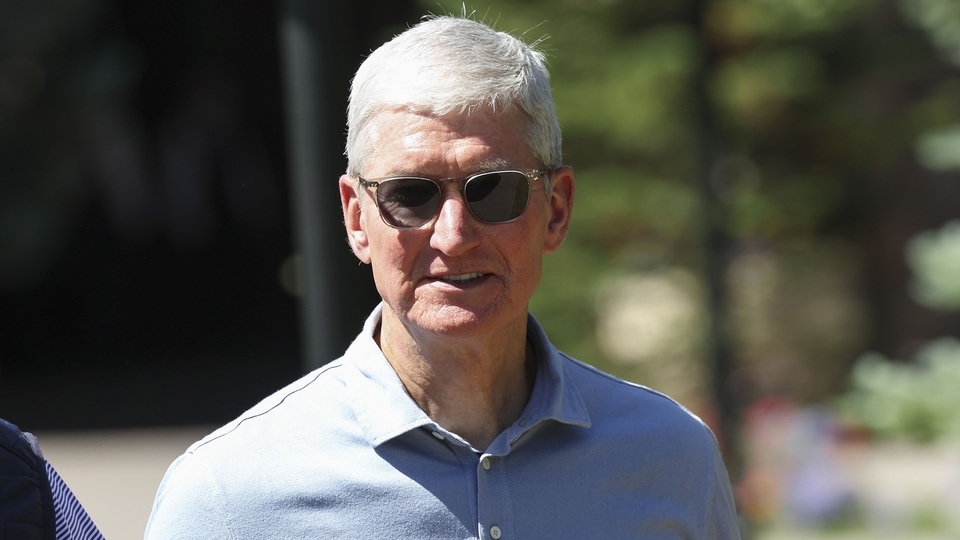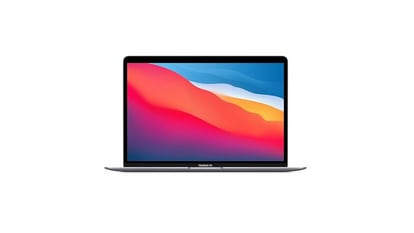Apple CEO Tim Cook Uses His Star Power to Fend Off Antitrust Threat; Steve Jobs mantra ditched
Tim Cook led Apple Inc spent a record amount on lobbying in the first half of the year


Apple Inc. Chief Executive Officer Tim Cook wasn't fully sold on having a team of Washington lobbyists a decade ago. Like Steve Jobs, his predecessor and mentor, Cook believed in the mantra that Apple's slick products should do the talking. But Apple's hands-off era in the nation's capital is over.
Cook has become one of the country's most politically active tech CEOs in recent years as Apple struggles to fend off antitrust legislation gaining traction in Congress. The company is ramping up its lobbying spending and hiring well-connected former congressional aides. And it's cozying up to powerful Washington figures, often deploying Cook to make Apple's arguments directly to lawmakers.
The antitrust measure, which could come to a vote in the Senate before its August recess, would bar tech giants from using their platforms to undermine rivals. One provision seeks to break Apple's stranglehold on its App Store and could cost the company billions of dollars.
Apple is spending more than ever on federal lobbying. It reported a record $4.6 million in the first half of this year, $1.5 million more than its first-half figure a year ago. Though Apple disclosed Wednesday that its second-quarter lobbying expenses dipped to $1.9 million, the $2.7 million it spent in the first quarter was about 85% higher than the same period last year.
Since the beginning of 2021, Apple has registered three new lobbying shops with ties to key lawmakers in the antitrust fight. It's also pulling lobbyists directly from the Capitol's corridors, bringing in-house a former aide to Senator Amy Klobuchar, the Minnesota Democrat leading the fight against Apple and other tech behemoths.
Apple disclosures show that its roster of in-house and outside lobbyists has increased by more than 50%, to 65 from 43, since 2015. Even so, the total number of lobbyists employed by the iPhone maker is lower than that of other major tech companies' Washington operations, some of which have dozens more.
And while the company famously doesn't have a political action committee to make candidate or party donations, the personal campaign contributions of some of its Washington executives have increased.
“Apple has been able to get by on goodwill and a light-touch approach for more than a decade,” said Matt Kent, who advocates for tougher antitrust laws for Public Citizen, the left-leaning consumer-rights group in Washington. The heightened Washington presence “is a testament to how big of a threat” Apple faces, Kent said.
Apple declined to comment for this story.
As Apple shells out millions of dollars to catch up to its tech peers like Meta Platforms Inc., Alphabet Inc.'s Google and Amazon.com Inc. that vastly outspend Apple on lobbying, its increasingly aggressive approach has rubbed some the wrong way. Two congressional aides said Apple's new strategy reminded them of Meta's Facebook, which they said has a reputation for blanketing congressional offices with combative arguments and demands. Meta didn't respond to a request for comment.
Last year, Apple lobbyists tried to stir up a jurisdictional fight between two House panels, according to two people familiar with the matter. As the Judiciary Committee weighed antitrust legislation aimed at the tech giants, Apple lobbyists unsuccessfully urged one influential staff member to try to persuade the Energy and Commerce Committee, which oversees some technology policy, to claim jurisdiction.
Still, the company's approach is working to some degree. The latest version of the Senate antitrust measure, the American Choice and Innovation Act, would make it easier for companies to defend any allegedly anti-competitive practice by arguing that it was “reasonably tailored” to protect user privacy. Apple lobbyists pushed hard for that change with the support of senators including Georgia Democrat Jon Ossoff. A spokesperson for Ossoff confirmed that the senator and Cook have talked.
Cook seemed to shake off his disdain for the Washington influence business in 2017 when he began cultivating a close relationship with former President Donald Trump. “Others go out and hire very expensive consultants, and Tim Cook calls Donald Trump directly,” Trump said in August 2019, speaking about himself in the third person. “Whenever there's a problem, he'll call.”
In the most recent regulatory push, Apple was caught flat-footed. The Obama administration looked the other way as Apple, Google, Facebook and Amazon grew into some of the largest and richest companies in history. But in recent years, antitrust scrutiny of the tech giants has spread across the world, traveling from Europe to the U.S.
Apple is now under fire up and down Pennsylvania Ave. as the White House, the US Justice Department, the Federal Trade Commission and both chambers of Congress probe the tech industry's power and influence. Apple has struggled to make inroads with President Joe Biden, who has called for a crackdown on the tech giants and hasn't met with Cook, at least publicly, to discuss issues beyond cybersecurity. The White House didn't respond to a request for comment.
The Apple chief, aiming to deflect government scrutiny with his star power, now phones or meets with senators regularly. He visited Washington at least twice in recent months. In June, when he was spotted in the Senate basement wearing a dark suit and tie, he met with Senator John Tester, the Montana Democrat, and numerous Republican senators, including Minority Whip John Thune of South Dakota, Joni Ernst of Iowa and Missouri Republican Roy Blunt. A spokesperson for Tester confirmed that he met with Cook. Thune, Ernst and Blunt didn't respond to requests for comment.
“It's significant when a principal from a large company, not to mention one of the biggest companies in the world, comes to a lawmaker and makes the case directly to them,” said Public Citizen's Kent. “Lawmakers understand what that means.”
Apple has spent years branding itself as the most privacy-friendly major tech company, launching a series of products and initiatives aimed at curtailing commercial surveillance and limiting the degree to which other companies can access data on Apple customers.
It has used that reputation to argue that the antitrust legislation could harm Apple's ability to protect user privacy and security, claiming that the bills under consideration would make it easier for hackers to install malware on iPhones.
“This is a top priority for Apple,” said Matt Fossen, a lobbyist with Proton AG, which sells an email service that uses encryption to protect users' privacy and favors the antitrust measure. “Their publicists, their lobbyists, their lawyers,” he added, “are all working on this fulltime.”
The App Association, a trade group that counts Apple as one of its largest funders, has issued reports echoing Apple's claim that the antitrust bills would erode protections for users of Apple's App Store.
“Here in Washington and elsewhere, policymakers are taking steps in the name of competition that would force Apple to let apps on the iPhone that circumvent the App Store,” Cook in April said in a rare speech in Washington. “That means data-hungry companies will be able to avoid our privacy rules and once again track our users against their will. It would also potentially give bad actors a way around the comprehensive security protections we've put in place putting them in direct contact with our users.”
In meetings with lawmakers, Cook has said that Apple should be treated differently than Facebook and Google because Apple's business model doesn't rely on vacuuming up user data, unlike its tech peers. In the meeting with Senate Republicans in June, Cook leaned into Apple's major talking point: that the antitrust legislation could harm online privacy and security.
Some experts suggest that Apple's privacy arguments are overblown, saying the company would continue to have wide latitude to enforce its own privacy policies under the legislation. Others have pushed back on Apple's security arguments by pointing out that most of the security protections are located on the iPhone itself, not within the App Store.
“Apple is leveraging their goodwill to spread misinformation about privacy and security concerns,” said Alex Harman, a lobbyist with the Economic Security Project, an advocacy group that favors the antitrust measures. Apple, meanwhile, portrays itself as “the good big tech company that doesn't lobby,” Harman said.
To bolster its lobbying prowess, Apple has hired Bloom Strategic Counsel, a firm led by Seth Bloom, a longtime senior aide to Democrats on the Senate antitrust subcommittee. Another notable hire is the firm Federal Street Strategies, which includes Andy Jones, a former aide to Senator Ben Luján. The New Mexico Democrat has led the way in opposing the antitrust bills over concerns that they could affect the tech companies' ability to remove hate speech and misinformation.
Apple has also arranged meetings between on-the-fence lawmakers and Apple's privacy chief, Jane Horvath, according to two people familiar with the meetings.
Its top lobbyists, meanwhile, have also upped their campaign contributions. Tim Powderly, Apple's senior director of government affairs, gave $26,100 in 2021 versus about $8,000 in 2020. That's more than a tripling in contributions in one year, though still far less than the nearly $100,000 that Microsoft's top government affairs executive doled out over the last year and a half.
This year, Powderly is on track to spend even more, doling out thousands of dollars to lawmakers leading the charge against the antitrust legislation. Recipients include a coalition of moderate House Democrats; House Minority Leader Kevin McCarthy; and Oregon Democratic Senator Ron Wyden.
Apple's government affairs shop reports to Lisa Jackson, the company's vice president of environment, policy and social initiatives. The former administrator of the Environmental Protection Agency in the Obama administration, Jackson maintains a special level of access to Washington power players: She was recently seen sitting next to House Speaker Nancy Pelosi during a private fundraising event. Pelosi's office did not respond to a request for comment.
Jackson also has ramped up her political donations. She gave $36,500 to the Democratic National Committee in February and has given thousands of dollars to Democratic leaders, including Pelosi and Senate Majority Leader Chuck Schumer. She gave $50,000 to Biden's 2020 campaign.
Fossen, the Proton lobbyist, said it's hard to miss Apple's new visibility. Staff and lawmakers often tell him that they recently met with Apple. “Wherever we turn our heads, we find out Apple was also there, making their side of the argument.”
Catch all the Latest Tech News, Mobile News, Laptop News, Gaming news, Wearables News , How To News, also keep up with us on Whatsapp channel,Twitter, Facebook, Google News, and Instagram. For our latest videos, subscribe to our YouTube channel.

























